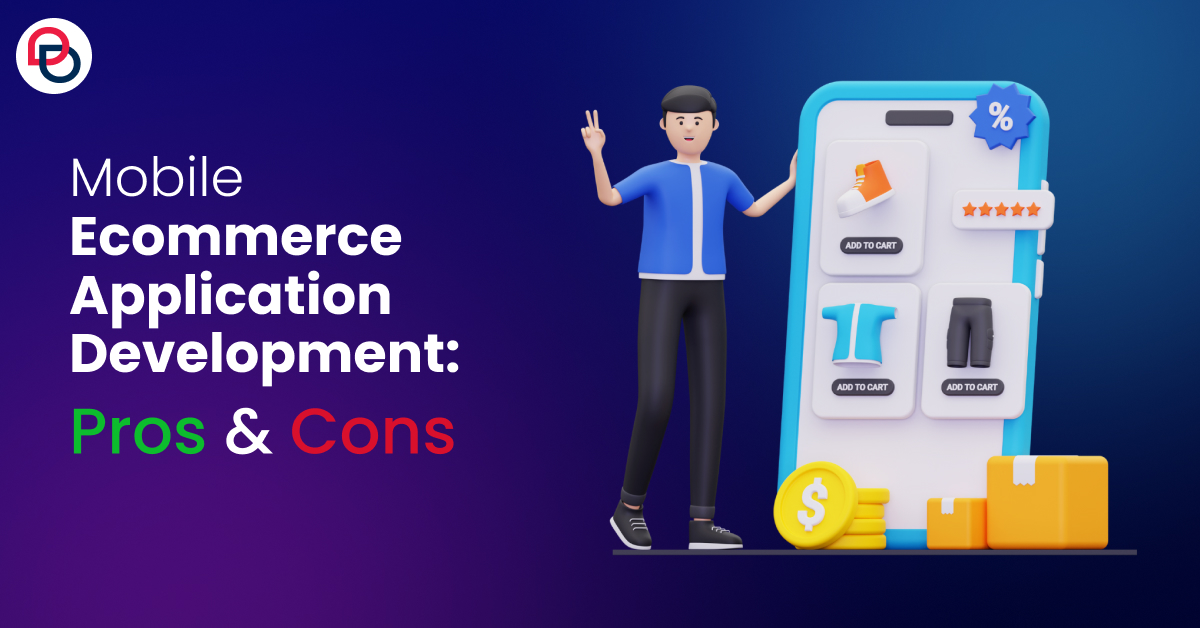Mobile Ecommerce Application Development: Pros & Cons
Faster, smoother, more personalized. This is what any business owner should expect from their mobile eCommerce app. Shopping on a mobile app is much more superior as compared to its website counterpart. For online business owners seeking ecommerce application development to build solid customer relationships and enjoy more sales opportunities, apps are certainly the answer.
However, like everything else, they have their downsides. The good news is that these drawbacks are minor and can be managed with proper planning. Before connecting with an ecommerce development company in Dubai for your project, go through this blog and see what you can expect.
Advantages of Mobile eCommerce App
1. User Experience
Mobile apps provide a better user experience than websites. Design layout is aligned to smaller screens and consequently features are made to be simple. Navigating an app feels instinctive, allowing customers to be able to look for what they want and make purchases without delay. A friction-free experience ensures that they keep coming back.
2. Transactions
Apps are built to be quick. They load fast and work efficiently, even with poor internet connectivity. With customer details, such as their addresses and payment methods, cached in the app, completing a transaction is faster than ever before. The dreaded cart abandonment gets highly reduced.
3. Push notification
Push notifications are a great way to keep customers engaged. Flash sales, back-in-stock alerts, or personalized discounts – these are kinds of notifications that reach customers in real time. As the communication happens directly with the customer, they begin to trust the brand, and shoppers can easily go for a repeat purchase.
4. Personalization and Customization
Apps can track user behavior for personalized shopping experiences. It provides product recommendations, deals that match the user’s interests, and specially prepared content based on user habits. When they come across this, customers are bound to feel valued and in turn become loyal to brands.
5. Integration with Mobile Features
During mobile ecommerce application development, developers make the functionality of the app dependent on smartphone features. Location-based applications utilizing GPS can be used to apply geolocation-based discounts or locating stores nearby. The camera feature allows the QR or barcode scanning which is extremely convenient during transactions, while the biometric authentication provides secure quick logins. These features create an experience that websites cannot match.
6. Offline Accessibility
Apps enable customers to view product catalogs or saved items even if they may be offline. Although transactions are internet-dependent, the ability to use the app offline keeps shoppers engaged, even in areas with poor connectivity.
7. Brand Visibility
An app icon sits on a customer’s device, so the brand visibility is constant. A website, however, is something that users have to search for, and an app stays in front of your customer’s eyes every day. They act as consistent reminders of your brand and build a stronger connection over time.
8. Customer Loyalty Programs
Apps help manage loyalty programs quite simply. Customers can earn and redeem points, track rewards, and receive exclusive offers through an app. This integration encourages customers to be loyal and interact with your business more often.
It’s easy to see how ecommerce development services in Dubai can help you maximize your online business’s potential.
Drawbacks of Mobile eCommerce Apps
1. Development Expenses at the Start
A superior-quality ecommerce mobile application does not come for free, especially if you’re targeting both iOS and Android platforms. There are design, development, and testing costs. Also, you would have to set aside a budget for its maintenance and periodic updates. The good thing is, the growth potential over time will well outweigh such investments.
2. Competition in the App Store
Millions of options crowd the app stores, making it hard for new apps to stand out. In such a scenario, strong branding and marketing are necessary to drive downloads. While this can be challenging, you can set your app apart by offering unique features and app-exclusive deals.
3. Updates and Maintenance
Mobile apps require constant updating for compatibility with the latest operating systems and newer devices. The effort is continual and tends to take up a lot of time. Without updates, the app’s performance will degrade, causing frustration for customers and impacting your brand reputation.
4. Dependence on Downloads
The fact that mobile ecommerce apps need to be downloaded before use, can at times be a barrier for casual shoppers. Long-time customers are more likely to download your app, but others may consider it a time-taking process. Promoting app-specific discounts or features would give potential users more incentive.
5. Smaller Initial Reach
To start with, apps are only accessible to those users who directly download it. Visibility and reach is limited compared to websites, which can be accessed by anyone with an internet connection. This limitation gets reduced over time as more shoppers use your app.
Mobile eCommerce apps expand your business’s circle of customers, substantially boosting revenue. After all, customers want a shopping experience that is both personalized and convenient. While there are some challenges, they are manageable with the right planning. Since ecommerce store owners prioritize long-term growth, the advantages of mobile apps far outweigh the drawbacks.
For your mobile ecommerce application development project, get in touch with Brainium’s experts.



